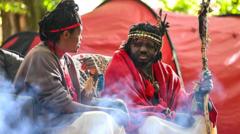Should a Tribe Be Evicted from Scottish Woodlands?

Published: 2025-09-12 12:42:25 | Category: technology
This article delves into the eviction of the self-proclaimed Kingdom of Kubala from privately-owned land in the Scottish Borders, highlighting the group's claims, legal actions, and community responses. The situation raises questions about land rights, cultural identity, and local governance, showcasing the complexities surrounding such unique claims to heritage and territory.
Last updated: 25 October 2023 (BST)
Background of the Kingdom of Kubala
The Kingdom of Kubala, a self-styled "African tribe," has recently attracted attention due to their claim of ancestral rights over land in the Scottish Borders. The group comprises three individuals: Kofi Offeh, who identifies as King Atehehe; Jean Gasho, also known as Queen Nandi; and Kaura Taylor, referred to as Asnat. They assert that the land they are occupying was stolen from their ancestors over 400 years ago.
Key Takeaways
- The group has been camping in woodland near Jedburgh for several weeks.
- A sheriff has issued an eviction order after the group ignored a prior notice to vacate.
- Their claims of ancestral rights have sparked controversy and legal challenges.
- Local authorities and community leaders have expressed concern over the group's actions.
- The Kingdom of Kubala has gained a significant following on social media platforms.
The Legal Proceedings
The eviction order was granted by Sheriff Peter Paterson after the Kingdom of Kubala failed to vacate the land by 17:00 on Monday. This decision comes after the group had already been evicted from a previous campsite earlier in July. Despite their claims to the land, the sheriff's ruling underscores the legal boundaries regarding land ownership and occupation in Scotland.
According to local authorities, the landowners, David and Mary Palmer, had taken appropriate legal steps to reclaim their property. Jedburgh councillor Scott Hamilton stated that the group was breaking the law by occupying land that belonged to someone else. He expressed disappointment that the Kingdom of Kubala had ignored opportunities to engage with the council, suggesting that the community was willing to assist them under lawful circumstances.
Community Response
The presence of the Kingdom of Kubala has evoked mixed reactions within the local community. While some residents have expressed concern regarding their occupation, others have shown support for their claims to heritage and identity. The group has made allegations of prejudice against the community, which has further complicated relations.
Social media has played a significant role in amplifying their message, with the Kingdom of Kubala gaining over 100,000 followers on platforms like TikTok and Facebook. This online presence has not only increased their visibility but also sparked debates about cultural identity and the legitimacy of their claims.
Understanding Ancestral Rights
The concept of ancestral rights is central to the Kingdom of Kubala's claims. This idea suggests that certain lands are rightfully owned by individuals or groups based on historical ties rather than formal ownership documents. In the case of the Kingdom of Kubala, the group argues that their ancestors were dispossessed of their land, thus granting them a moral right to reclaim it.
However, legal definitions of land ownership in Scotland are based on property law, which typically requires formal titles and deeds. The contrast between traditional claims and contemporary legal frameworks can lead to complex disputes, as seen in this case.
The Role of Local Authorities
Local authorities, like Scottish Borders Council, are tasked with maintaining law and order within their jurisdictions. The eviction order issued to the Kingdom of Kubala reflects the council's duty to uphold property rights and ensure compliance with the law. Councillor Scott Hamilton's comments highlight the balance local officials must strike between supporting community interests and addressing claims that may not align with legal standards.
The Impact of Social Media
The Kingdom of Kubala's rising popularity on social media has transformed their situation into a wider conversation about land rights, identity, and activism. With their growing follower base, they have been able to share their narrative and garner support from individuals worldwide. This digital presence not only serves as a platform for advocacy but also complicates the local community's response, as opinions on social media can differ significantly from those in real life.
As the group continues to assert their claims, social media may play an increasingly critical role in shaping public perception and influencing future actions, both legal and social. Their ability to mobilise support online raises questions about the power of digital platforms in contemporary activism.
What Happens Next?
The immediate future for the Kingdom of Kubala remains uncertain. Following the eviction order, members of the group have stated that they are not afraid of the legal implications and will continue to assert their claims to the land. Kofi Offeh remarked on the group's belief in divine guidance, suggesting that they will remain where they feel called to be until a higher power directs them otherwise.
The outcome of this situation could set a precedent for similar claims in the future. As land rights continue to be a contentious issue across the UK, the Kingdom of Kubala's case may inspire others to assert their own historical claims, leading to potential legal and social ramifications.
Conclusion
The eviction of the Kingdom of Kubala from land in the Scottish Borders raises important questions about land ownership, cultural identity, and the interaction between local authorities and self-identified communities. As the situation unfolds, it will be essential to monitor how these dynamics evolve and what implications they may have for similar cases in the future. The intersection of law, identity, and activism will undoubtedly continue to shape discussions around land rights in the UK.
FAQs
What is the Kingdom of Kubala?
The Kingdom of Kubala is a self-proclaimed group comprising three members who claim ancestral rights to land in the Scottish Borders, asserting that it was stolen from their ancestors over 400 years ago.
Why was the eviction order issued?
The eviction order was issued after the group ignored a previous notice to vacate the land by a specified deadline, leading local landowners to seek legal intervention.
What are ancestral rights?
Ancestral rights refer to claims made by individuals or groups based on historical ties to land, suggesting that they have a moral right to reclaim it despite legal ownership frameworks.
How has social media influenced this situation?
Social media has amplified the Kingdom of Kubala's message, allowing them to gather a significant following and engage in wider conversations about land rights and identity, complicating local community responses.
What might happen next for the Kingdom of Kubala?
The future for the Kingdom of Kubala remains uncertain, as they plan to continue asserting their claims to the land and may seek further dialogue or legal recourse in response to the eviction order.



